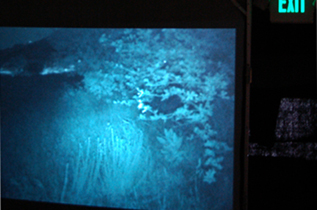
"Coyote Search" Terry Chatkupt
Upon entering the opening show for this year's PDX Film Fest, one encountered a shift in perception; the space-time continuum of linear living was altered somehow, and the viewer suddenly found him/herself immersed completely within a realm of video. The subtle bluish glow of screens and projections created an almost underwater swoon broken by intermittent bleeps, coyote yelps and the gamey, dramatic breath of a child's game. The effect was hypnotic. Yet, what exactly was altered in this sudden sea of screens and light? Of images captured (or made?) from our very real, very tangible world and then played back to us? The late great Baudrillard

The late Jean Baudrillard
would have perhaps turned up his nose in admittance that this was all a farce, intended merely to maintain our delusions of the Hypperreal with the exact medium which creates and maintains so much of it, and thus perhaps furthering the conundrum.
In those four too short days, the artists and curators brought together to form Retinal Reverb endeavored to exhibit the extent of what artists across the country are attempting within the rather tricky medium of video. The space for the opening show could not have been more apropos. The hangeresque warehouse was like a giant's lung that allowed each piece to breathe and resound, existing as fully as needed. The curators at Dia (website) and Italian academics alike would have applauded, "Here! Here!" to the choice of such a space.
The breadth of the video work that Retinal Reverb addressed was expansive. Each of the artists used the medium of video as a most playful forum in which both the formal and conceptual exploration of ideas was examined. There was an apparent awareness of the created conversation each piece could possibly generate, yet I had to wonder if that awareness extended into the art historical knowledge of the medium and its unfortunate ability to be used too haphazardly. Within the medium of video, there is perhaps the expectation that it might not be examined as critically as other mediums, given its relatively short history and extreme prevalence within everyday western life. The bit of statement made by the collective, "The Experimental Team "Hope" Folk Art Ensemble Experiment", embodied this sentiment as they assume the viewers conclusions too brashly.
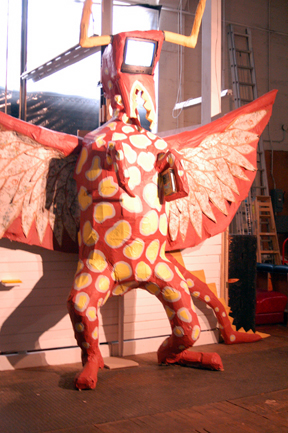
"Calle Me Ishmael" The Experimental Team "Hope" Folk Art Ensemble Experiment
Upon seeing the giant papier-mache monster with its title,"Call Me Ishmael" (which also happens to be the first line of Herman Melville's "Moby Dick"), emblazoned across a VHS tape in its claw, and then perhaps attempting to decipher the video of a video emanating from its head, one attempted to string together these bits of very specific, very loaded bits of formal clues. The bit of statement seems to convey that all of these formal clues lead to the rather dead end conclusion that the artists desire the viewer to think that television is some sort of void, a sort of figurative whale's belly that will swallow you whole. However, this seems a bit of a one-liner to me, but perhaps that is because I have never read "Moby Dick" nor seen "Point Break".
Other pieces in the show seemed almost to talk to each other around and through each other within the space, once again confounding their dimensions. Dan Gilsdorf's "Rail"
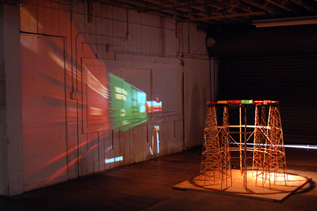
"Rail" Dan Gilsdorf
dealt poetically with the notions of perception in real time, projected video time, and the speed of light. The projection of the moving train onto the wall demystified the image projected, destroying all myths of video as reality and thus the notions of the Hyperreal. At one point during the opening, I witnessed the artist momentarily adjusting the train on the track. He stepped in front of the project's tiny camera then, and his face was suddenly projected onto the wall, enormous compared to the size of the toy train. It seemed an accidental accent to the piece, a fortunate witnessing of the human aspect of the artist's very relevant concerns. Even the shadow created by train on the floor beneath the rail seemed to conjure the endless rotation of sun and earth, the only true forces by which our lives are guided, despite our constructed artifices.
From the opposite side of the exhibition space, Mike Bray's "Meatlocker"
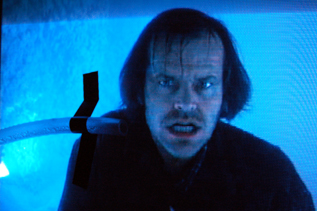
"Meatlocker" Mike Bray
seemed to converse with and further push Gilsdorf's ideas into a more specific arena. Bray recognizes the influence of the intake of images and ideas through the prevalence of film and video. By giving life to Jack Nicholson's image, Bray reifies the essence of the character in his memory. Nicholson becomes Bray's Frankenstein, literally breathing life into the character so alive in his memory.
While all of these pieces glowed and beeped to and at each other across the invisible plasma of the space and time running through the gallery, Emily Bulfin and Tahni Holt's piece, "Passing Out Heart Game" hummed at the center of the vortex.
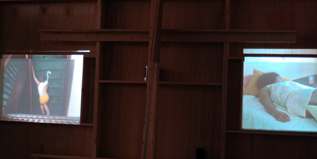
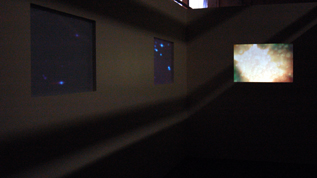
"Passing Out Heart Game" Emily Bulfin and Tahni Holt
The physical nature of the piece forced the viewer to experience the piece literally inside and out, and as one walked around and through the walled armature, the notion of context subtly hid and flitted between screens and shadows. The dynamic images of the children and galaxy were cropped and cut so tightly that the viewer was forced to exist and interact within the work. We as onlookers were never allowed to relate and project bits of false emotion by being given the faces or identities of the children involved, and thus we mirrored the role of the children in their game: at once active victims, willingly entering into an experience of which we have no idea the outcome or effects. This notion of entering into an experience which may indeed be out of one's control plays endlessly throughout the fabric of modern life, especially in terms of what we experience with the medium of video. Video seems the freefall form running rampant throughout our lives, rarely asking whether we want the experience or not. In this way, we are its victim and its subject as it molds and infiltrates our consciousness, an experience of modern living that is literally beyond our control. "Passing Out Heart Game" is the poetic allegory of this experience.
Retinal Reverb's brief run was unfortunate, but packed a powerful punch, exploring and pushing the bounds of the medium of video. It was a show Portland needed to see and have, resting not on its comfy laurels, but asking itself and its viewers to push the possibilities.
Moby Dick was the first serious book I got my hands on and sadly Ive seen Point Break... somehow neither of them make me think of winged paper mache devils... Ronnie James Dio does though!
Hyperreality truly is difficult staring into the square eye of a papier-mached Ishmael dragon.





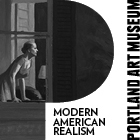























![[TypeKey Profile Page]](http://www.portlandart.net/nav-commenters.gif)